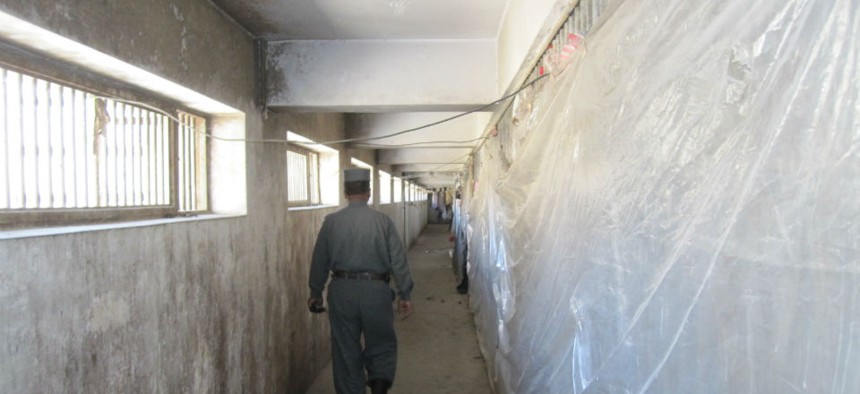
A hallway in the half-renovated Pol-i-Charkhi Prison. Special Inspector General for Afghanistan Reconstruction
U.S. Halted Work on Half-Renovated Prison in Afghanistan
Watchdog faults State Department oversight of contract.
A five-year-old State Department effort to upgrade Afghanistan’s largest prison has been halted with only half the contracted work performed, a watchdog found.
The Pol-i-Charkhi facility in Kabul Province -- designed in the early 1970s for 5,000 prisoners -- currently holds 7,400, according to a report by the Special Inspector General for Afghanistan Reconstruction. And though overcrowding has forced prisoners out into the halls, it appears to be well maintained, SIGAR determined, despite some “defective workmanship” performed under the $20.2 million contract with the Al-Watan Construction Co.
States’ Bureau of International Narcotics and Law Enforcement Affairs paid out $18 million to the contractor before terminating it “for convenience,” with only half the work executed. “A corrupt contracting officer's representative … was a factor in the oversight breakdown of the renovation work,” SIGAR John Sopko wrote, “and another COR who resigned his position was a factor in the financial settlement.”
The purpose of the renovation was to replace prison block holding areas with individual cells and improve the prison’s plumbing, electrical and septic systems. In a report to Secretary of State John Kerry and U.S. Ambassador James Cunningham, SIGAR cited an independent firm that identified shoddy workmanship, “including soil settlement issues and failure to connect back-up generators to the prison's power grid.”
The contractor “substituted wood for metal roof trusses without authorization and covered 30-year old wood trusses with new roofing material, rather than replacing them as required under the contract,” SIGAR determined in a probe from April to September. The renovation work was overseen by a contracting officer’s representative—a State employee—who was later convicted in the United States of improperly accepting gratuities from a bureau of narcotics contractor.
Three related projects that State funded at a cost of $5.3 million -- a potable water tower, a commercial power upgrade, and a new staff barracks -- were completed successfully, the IG reported.
State, after reviewing a draft of the report, said it is committed to completing the renovations, which might cost $11 million and another $5 million to construct a wastewater treatment plant to remedy wastewater pooling on the surface of the two septic/leach fields, the report said. State noted, however, that deteriorating security conditions in war-torn Afghanistan have hindered official travel to the site. (U.S. troops this week prepared to end operations in the country after a 13-year stay.)
SIGAR recommended that Kerry direct the bureau to determine the extent of the use of lesser-quality building materials, monitor future renovation costs, re-think the prison’s wastewater management needs and investigate how the contracting officer arrived at the final payment amounts to the terminated contractor before the contract was fulfilled.
State agreed with all recommendations except the one on probing the contractor, arguing that its own inspector general investigated the incident and applied discipline in 2010, when the contract was halted.







